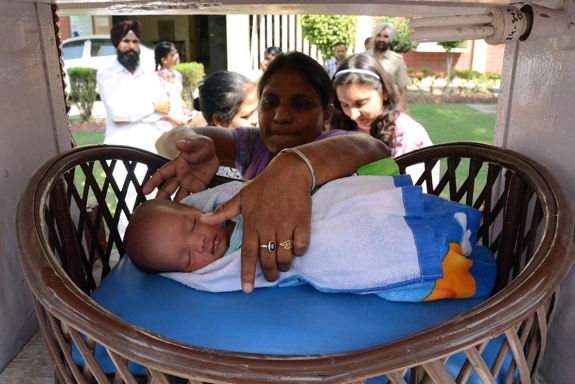
(above) A worker with the Indian Red Cross Society picks up an abandoned baby boy found at a drop-off box at the entrance to the Red Cross House in Amritsar, India in June 2015. (NARINDER NANU/AFP/Getty Images)
Peru Should Think Outside the 'Baby Box'
September 12, 2017 - U S News and World Report
Peru's Congress should nix a proposed law that would support the installation of "baby boxes" where children can be abandoned.
By Jessaca Leinaweaver, Contributor
Peru's Congress is set to debate a proposed law that would support the installation of "baby boxes" outside hospitals around the country. The law has plunged the Congress into controversy.
The idea behind "baby boxes" is to create multiple confidential locations where children up to age 1 may be abandoned without danger. Authorities would be alerted via a sensor system so that the child could be brought to safety. The abandoner – imagined as the infant's vulnerable mother – would not be subject to criminal charges.
The law's proponents argue that it will save children by offering a safe and anonymous way to ensure a child is cared for immediately after abandonment.
Critics, meanwhile, think that the law is a route to child trafficking and the legalization of abandonment. These critics include Peru's ministries of Justice, Finance, and Women and Vulnerable Populations, as well as the United Nations.
Similar "baby boxes" have been installed across Europe, and in 2012, the United Nations Committee on the Rights of the Child came out against their use. For example, the Committee's 2011 report on the Czech Republic stated that the boxes violate five different articles of the United Nations Convention on the Rights of the Child. That convention, which establishes international law as to how children are treated, is "the most widely and rapidly ratified human rights treaty in history." (Only the United States and Somalia have failed to ratify the convention.)
If Peru joins other nations in establishing baby boxes, Peruvian children could be at further risk: Those placed in baby boxes may be deprived of their United-Nations-given rights to a name, an identity, and to know and be cared for by their parents to the extent possible.
Baby box programs purport to protect children by allowing them to be safely abandoned to the care of the government. But Peruvian critics of the proposal rightly ask whether their government is able to provide that care.
One clue to the politics behind this proposal lies in examining the affiliations of its authors. The men behind the bill – the congressman Yonhy Lescano Ancieta of the Popular Action party and the president of the "Savior Cradle Association," Dr. Alberto González – are quoted using pro-life language. And indeed, the English phrase "baby boxes" appears in the Peruvian material as "cunas salvadoras," which can be translated as "savior cradles."
In research I did on adoption and family policy in Madrid, Spain, I found similar pro-life orientations behind a campaign which established an emergency hotline for people considering abandoning their infants. The Madrid campaign posted billboards showing a bright pacifier on a dark, rainy cobblestone street reading, "Before you abandon me, call this number."
My interviews with officials revealed generalized skepticism about the true motivations of the campaign. Child abandonment is rare in Spain – indeed, in the campaign's first year and a half, only six babies had been processed through this program. And in a natural experiment like this, there was no way to know what those six babies might have encountered otherwise. Officials I spoke to thought instead that the campaign was actually a thinly-veiled pro-life message.
Child abandonment happens more frequently in Peru than in Spain, but – similar to the European countries where the boxes have been installed and criticized – it doesn't always happen to babies. In research I did on child abandonment and adoption in Peru, I found that the children available for adoption were more likely older, had resided in orphanages for some time, and were often part of sibling groups. Statistics collected by the public defender's office in Peru concur: While in the capital of Lima abandoned children were more likely to be a year of age or younger, in the rest of the country they were overwhelmingly six and older.
Those older children don't fit very well in the "savior cradles" envisioned by congressman Lescano.
Whatever the hidden rationale of the proposed law in Peru, the upshot is the same as it was in Spain, in the Czech Republic, and in other places baby boxes have been criticized. Rather than using the scary image of abandoned babies to achieve veiled political ends, politicians who truly care about children's welfare must work on the root causes of child vulnerability. That includes supporting family planning initiatives, improving the quality of education, especially in Peru's rural areas, and facilitating access to family court and child support.
It's hard to fit all that in a "savior cradle," so Peru's legislators should take this chance to think outside the "baby box," and instead pass laws that will genuinely support children and families.
Jessaca Leinaweaver directs the Center for Latin American and Caribbean Studies at Brown University's Watson Institute. She is a Public Voices Greenhouse part... full bio